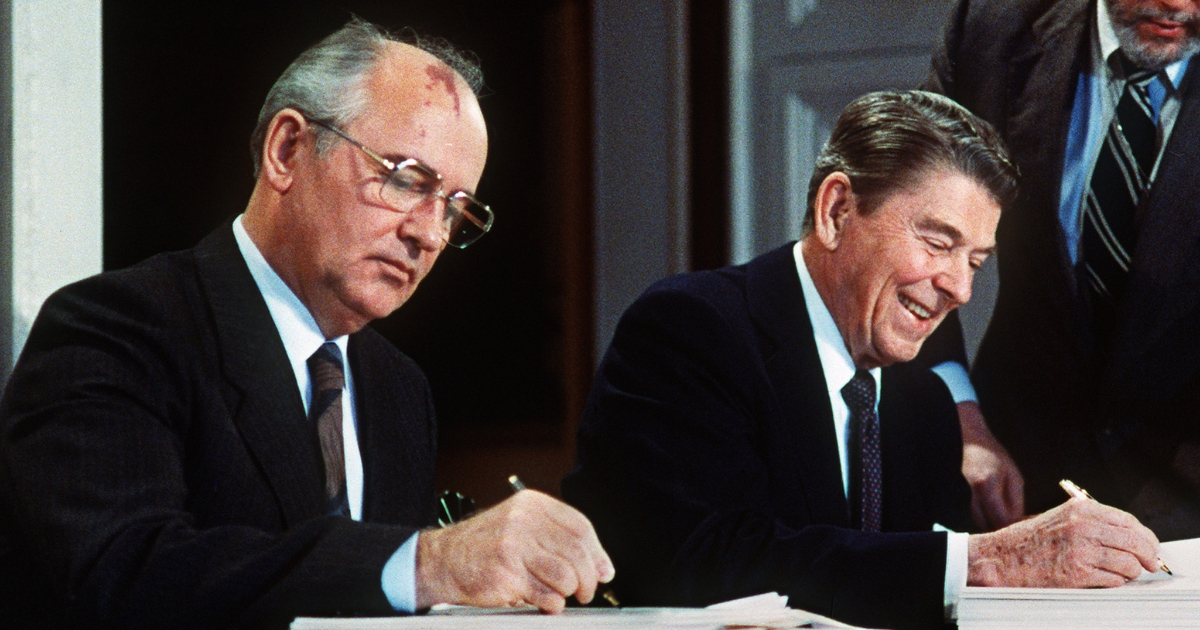
How Reagan Defeated Gorbachev: The Story Public Schools Never Taught
Mikhail Gorbachev, head of The Mikhail Gorbachev School of American History, has called President Donald Trump’s decision to have the United States withdraw from the Intermediate-Range Nuclear Forces Treaty reckless and not the work of “a great mind.” The laugh bubbles up from the toe bone, past the ankle bone, all the way up to the neck bone and then back down to the funny bone, finally exploding in a huge GUFFAW!
Gorbachev, the final leader of the Soviet Union, had such a great mind that he was a confirmed believer in all that communist-socialist nonsense and insisted that the state-directed Soviet economy was “fundamentally sound.” He even argued, as late as 1987, that “the works of Lenin and his ideals of socialism (were) … an inexhaustible source of … creative thought, theoretical wealth, and moral sagacity.”
That is nonsense of a kind only a fool — or 28-year-old Democrat somethings like Alexandria Ocasio-Cortez (newly elected congresswoman in New York’s 14th congressional district) — could believe.
But the left loves Gorbachev, even as it disparages President Ronald Reagan who forced Gorbachev’s hand. You see it in history books.
In “The American Pageant,” for example, a textbook widely used in American high schools, Reagan is described as a bumbler, and Gorbachev as more or less a “great mind.” Here’s how the authors introduce Reagan: “Though Reagan was no intellectual, he drew on the ideas of a small but influential group of thinkers known as ‘neoconservatives.'”
Reagan no intellectual? What bias! What about FDR? He had a “C” average in college, but the authors of “The American Pageant” treat him as the wisest of men.
Their description of Reagan tells only a small part of the story. Reagan paid much more attention to classical liberal thinkers from Adam Smith to Friedrich Hayek and to the founding magazines of modern conservatism, William F. Buckley Jr.’s National Review, as well as Human Events and The Freeman, but “The American Pageant” doesn’t mention those widely influential sources of conservative thought.
The textbook says: “An actor-turned-politician, Reagan enjoyed enormous popularity with his crooked grin and aw-shucks manner. The son of a ne’er-do-well, impoverished Irish-American father with a fondness for the bottle, he had grown up in a small Illinois town. … Good looks and a way with words landed him acting jobs in Hollywood, where he became a B-grade star in the 1940s. … In 1954 he became a spokesman for the General Electric Corporation at a salary of some $150,000 per year. In that position he began to abandon his New Dealish political views and increasingly to preach a conservative, antigovernment line.”
Get it? Reagan was “no intellectual” and he listened to neoconservatives. The textbook authors say Reagan’s father was a drunk and he became merely a “B-grade” actor. But when he started making money with General Electric, well, then he “began to abandon his New Dealish political views” deciding instead “to preach a conservative, antigovernment line.”
Here’s what the textbook authors have to say about Gorbachev: “Gorbachev was personable, energetic, imaginative, and committed to radical reforms. … He announced two policies with remarkable, even revolutionary, implications. Glasnost, or ‘openness,’ aimed to ventilate the secretive, repressive stuffiness of Soviet society by introducing free speech and a measure of political liberty. Perestroika, or ‘restructuring,’ was intended to revive the moribund Soviet economy by adopting many of the free-market practices — such as the profit motive and an end to subsidized prices — of the capitalist West. Both glasnost and perestroika required that the Soviet Union shrink the size of its enormous military machine and redirect its energies to the dismal civilian economy. That requirement, in turn, necessitated an end to the Cold War.”
Those comments are a work of almost pure fiction. They give no credit to Reagan. And they suggest that “personable, energetic, and imaginative” Gorbachev, a lover of freedom, changed the Soviet Union and ended the Cold War because he wanted to do so. That’s ridiculous. Probably the beginning of the end of the evil Empire was Reagan’s liberation of Grenada in 1983. Then, by proposing the Strategic Defense Initiative (which came to be called “Star Wars”) Reagan forced Gorbachev, who knew the USSR could never win a competition with the United States, to restructure the Soviet Union.
And the rest is history — but not history you will find in a typical high school American history textbook.
The Education & Research Institute (of which I am chairman) has put online, at TrueAmericanHistory.US, a critique of “The American Pageant,” from which many of the comments above are taken. It is an attempt to ensure that students have an understanding of true American history — not one from biased American journalists and other liberal writers, most of whom could qualify as adjunct professors at The Mikhail Gorbachev School of American History.
The views expressed in this opinion article are those of their author and are not necessarily either shared or endorsed by the owners of this website. If you are interested in contributing an Op-Ed to The Western Journal, you can learn about our submission guidelines and process here.
Truth and Accuracy
We are committed to truth and accuracy in all of our journalism. Read our editorial standards.
Advertise with The Western Journal and reach millions of highly engaged readers, while supporting our work. Advertise Today.











